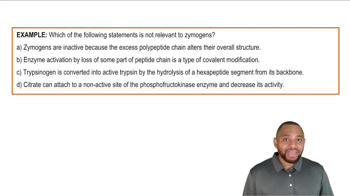Diet soft drinks that are sweetened with aspartame carry a warning label for phenylketonurics. Why?
The pancreatic proteases are synthesized and stored as zymogens. They are activated after the pancreatic juices enter the small intestine. Why is it essential that these enzymes be synthesized and stored in their inactive forms?
 Verified step by step guidance
Verified step by step guidance
Verified Solution
Key Concepts
Zymogens

Activation of Enzymes

Digestive Safety Mechanism

a. Name the four compounds within the citric acid cycle that the carbon skeletons of the glucogenic amino acid enter as.
Can an amino acid be both glucogenic and ketogenic? Explain why or why not.
Why might it be a bad idea to take large quantities of a single amino acid dietary supplement?
Determine how many ATPs you would make if you consumed a tetrapeptide comprised of leucine, histidine, valine, and lysine. Have each member of your group take one of the four amino acids and determine the number of ATPs their amino acid would make and combine them to get the total.
Unlike most amino acids, branched-chain amino acids are broken down in tissues other than the liver. Using Table 18.3, identify the three amino acids with branched-chain R groups. For any one of these amino acids, write the equation for its transamination.
